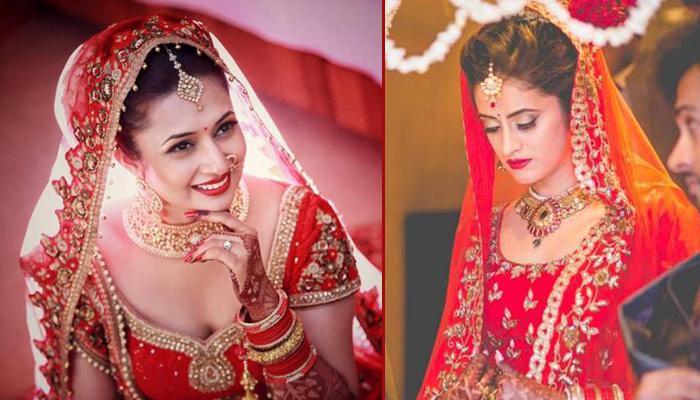About Us
Advertise With Us
RSS Feed | Content Syndication
Terms & Conditions
Privacy Policy
Contact Us
BollywoodShaadis.com © 2026, Red Hot Web Gems (I) Pvt Ltd, All Rights Reserved.

In a traditional Hindu wedding, the wedding ceremony takes place in Vedic fashion. Here, the time of the marriage is decided by the pandit based on the star-charts of the bride and groom and considering what is the most auspicious time (depending on planetary alignment). The bride and groom, dressed in all their finery sit together for this ceremony. They sit before the holy fire (agni), which is considered extremely important and sacred by Hindus, as it is all cleansing and pure. The fire is witness to the marriage and the vows the bride and groom make to each other during the wedding ceremony.
Bride and groom take 7 vows in all, and are recited in Sanskrit by the pandit first, and then repeated in Hindi. The groom and the bride repeat the vows and then must accept them without any inhibitions for a marriage to be considered legitimate. There are different sets of vows for each of them, but with minor differences. The vows are said after the couple walk around the holy fire – 7 rounds, thus 7 vows. This is known as the Saptapadi (Sanskrit: Seven steps). The rounds are known as pheras. It is said that a man and a woman become husband and wife only when they have climbed these 7 steps.
The 7 vows made by Indian grooms to their wives during the wedding ceremony are as follows:
1. In the first vow, the groom makes a vow to his bride that he will, for his part, provide the money and means to run a happy household and family. He also promises to avoid any of the things that were likely to harm his wife and family.
2. The second vow that the groom makes to his bride is to remain committed to her forever. He promises he will love her forever and provide courage and strength.
3. The groom then makes the third vow to his prospective wife, and in this vow he prays to God and asks that the be blessed with prosperity, wealth and the ability and means to take care of their children, educate them and look after all their needs.
4. The fourth vow has the groom thanking his bride. He thanks her for bringing love, happiness, auspiciousness and sacredness in his life. He thanks for all the good things she brings to his life.
5. The couple then prays together in the fifth vow. They pray to Goddess Lakshmi, the Goddess of Wealth, to grant them with prosperity and her blessings for the rest of their lives.
Continue reading below
6. The groom makes the sixth vow to his wife, and promises that he will keep her happy forever. He also tells her that he promises to make her joyful and provide her with peace time and time again.
7. Finally, only the seventh vow remains, and the groom now tells the wife that with this last vow and walk around the fire, our relationship is firm and we’re inseparable. He also tells his wife that now you are mine forever and I am yours and may we live happily together.
These are the seven vows that the groom makes to his wife. In return, the bride also has to make seven vows to her husband. These seven vows, and the pheras are what constitute the most important part of a traditional Hindu marriage.
Since the traditional vows are in Sanskrit, there are many wedding planners who provide the vows and their detailed meanings in English. The latest trend is also to give guests copies of the vows in English, so that everyone knows what they are and what they mean.
